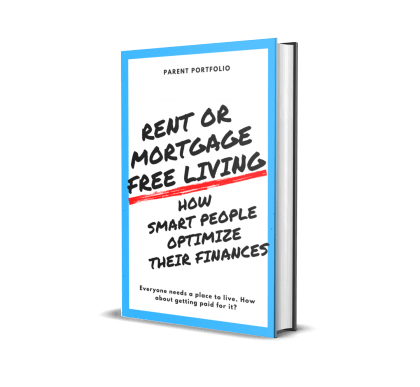I Need Money: How Much Money Is Enough?

Do you make a decent wage, participate in your company’s 401k and wonder “How much money is enough?” Or, do you feel unappreciated for your hard work and prefer to quit your job to spend more quality time with your family?
“But, I NEED MONEY. I have BILLS and STUDENT LOANS to pay!”
Many people are stuck in the rat race by being financially dependent on their employer to pay their expenses. Many people work because they HAVE to and not because they WANT to. They feel like they have no money.
How does someone get out of the rat race?
How Much Money Is Enough To Be Financially Independent
To be financially independent means someone is not dependent on their employer or not required to work to pay for their expenses. Instead, this person has the option and the choice to work and even quit!
The way to be financially independent and still have the ability to pay off expenses is through passive income!
Passive income is income that is generated by an asset that does not require your full-time attention, like a job. These passive income-generating assets can come in several different forms including stocks, real estate, royalties, and patents.
Therefore, whether a person works or not, their assets will be the primary source of income paying monthly expenses.
How much money is enough to be financially independent? Is $40,000 a good salary? Every person and household is different.
They can vary based on location or the number of people within a household. For example, the cost of living can be more expensive in a different part of a country compared to another. Or, the grocery bill might be more expensive with a larger household compared to a single person.
Or, maybe you’re close to retirement and just need a part-time job to supplement income, which is often called Barista FIRE.
Therefore, how much money a person needs to be financially free is also called financial independence number!
Calculate Your Financial Independence Number
The financial independence number is the dollar amount a person’s assets needs to generate monthly. The purpose of the passive income is to pay off one’s monthly necessary expenses.
Therefore, the financial independence number is calculated by identifying all the monthly necessary expenses and calculating the sum.
Necessary expenses include mortgage/rent, groceries, insurance, etc. Necessary expenses do not include shopping, entertainment, restaurants.
Generate Passive Income & Reduce Expenses
Once the financial independence number has been identified, the next step is to generate enough passive income to cover all the monthly expenses.
For example, imagine a person’s monthly expenses are $3,000. However, that person owns five investment properties that cash flows $600 a month or $3,000!
Their asset has generated enough passive income to allow them to be financially independent!

If you’re interested in investing in real estate check out the post: Real Estate Investing for Beginners and 4 “No Money” Ways to Invest In Real Estate.
If you’re interested in stocks, such as Exchange-Traded Funds (ETFs) or mutual funds, get started with E*TRADE that offers various ETFs and tools to help investors find what they’re looking for.
Real estate and stocks are not the only ways to make money. There are online jobs available that even teens can do. Check out these 25 different ways a person can make $1,000 in a week.
Another way for someone to reach their financial independence number is to reduce their expenses. The lower the expenses, the lower the number!
This can be achieved by refinancing a mortgage or moving to a location with a lower cost of living. Or, shop around for a different home and auto insurance provider to have lower premiums.

Create an Emergency Fund
The financial independence number only takes into account the monthly expected expenses. In the case an unexpected expense occurs, an emergency fund can provide the needed relief!
One summer, the air conditioner in his car stopped blowing cold air. The air compressor needed to be replaced, which cost over $2,000! Fortunately, we had an emergency fund to handle unexpected scenarios just like this.
I recommend three to six months’ worth of necessary expenses. For example, for a $4,000 worth of monthly expenses, an emergency fund should about $12,000 to $24,000.
How Much Money Is Enough To Retire Early
We know now how much money it takes to be financially free. How much money does it take to supplement one’s lifestyle and confidently live without depending on a 9 to 5 job?
According to the United States Census Bureau, the median household income in 2018 was $61,937.
However, is $62,000 a year in passive income sufficient enough to retire early? Maybe. It all depends on someone’s lifestyle and the cost of living.

Maybe someone can live off $45,000 a year? Or, maybe someone needs at least $70,000. The important point is this number must exceed someone’s annual necessary expenses.
The real question is “How much ASSETS should a person have to generate a certain dollar amount annually?”
Following are example scenarios where James wants to retire early generating $40,000 a year (about $3,300 a month) passively through his assets.
For a more detailed way to accurately calculate your retirement and build a plan, check here for more!
Scenario 1: Real Estate
James purchases his first investment property that generates $200 a month in cash flow after expenses.
Using a real estate investing strategy, the BRRRR method, James can out his initial investment from his first property and purchases a duplex that generates $1000 a month in cash flow.
He then applies the same strategy and purchases a fourplex that generates $2,500 a month in cash flow.
James needed to accumulate seven units to generate a monthly cash flow of $3,700! James has reached his target number and can technically retire early.
The example above was highly simplified and it’s important to point out that not all investment properties are the same. Based on different factors, such as property tax, vacancy rate, and insurance, can affect the overall cash flow.
That’s why in real estate it’s always important to know your numbers! He made sure he had good enough deals to generate positive cash flow from his properties.
The way James was able to reach his target number by scaling and increasing the number of units he owned. In the case of inflation, James just needs to increase rent over time.
Scenario 2: Stocks
James plans to use the 4% rule to allow him to withdraw at least $40,000 a year (not including inflation) from his stock portfolio.
The 4% rule is when a person withdraws only 4% annually from their investments. This strategy allows the investments to continue to grow while a person only withdraws from the interest gained.
Therefore, to determine how much James needs to save up in his investment accounts, we need to do a bit of algebra.
Target Investment = Annual Withdraw / 4% = $40,000 / 0.04 = $1,000,000
According to the math above, James needs to save up $1,000,000 in his investment accounts to withdraw at least $40,000 a year.
To go into more depth and calculate how long it will take an investment to double in value based on its annual rate of return, check out the Rule of 72.

Can Money Buy Happiness?
If you were given $1,000, what would you do with it? Take a moment to think about it.
What would you do if you were given 5 figures, such as $10,000? Take a moment again to think about it.
How about $100,000 or even $1,000,000?
At what dollar amount have all your needs been met? Do you need a million dollars? Have you thought about helping your friends or family? Or, even supporting a charity or a church?
Money doesn’t make anyone evil. Instead, money amplifies who a person is!
Your Peers Make You Poor
I’m a big fan of Keanu Reeves.
My husband jokes that I can “fangirl” on Keanu all I want because he thinks I’ll never meet him. So, if Keanu sees this post, “Hello”.
When it comes to money, people don’t compare themselves to the 1% wealthiest people or celebrities, because they too believe attaining such a high financial status is unreachable.
So, no mansions, yachts, and luxury cars for them.
Instead, people compare themselves to their peers, family members, and friends. They see what others around them have and ask “Why can’t I have that too?”
So, they incur more debt to buy bigger houses, better cars, and more smart devices just to keep up with “The Joneses”.
Their perceived happiness is being dictated by someone else. And, with the increase in technology and the internet, social media creates an endless feedback loop reminding people of what they don’t have.
Money Buys Time
Can money buy someone happiness? No. But, what money can buy someone is more time!
The money a person has saved up can used to pay their living expenses so they can spend the time how they want.
The time gained can now be spent more with their family, traveling to gain new experiences, or focusing on personal achievements! Time is spent on experiences that make them happy.
The amount of time someone can live off their money is the true measure of someone’s wealth. Therefore, the key to happiness, gaining more time, and more freedom is to generate more passive income!






